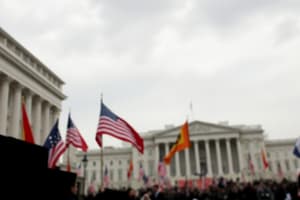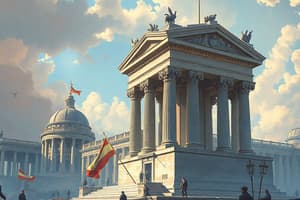Podcast
Questions and Answers
Why is voting considered a fundamental mechanism in democracy?
Why is voting considered a fundamental mechanism in democracy?
Voting allows citizens to express their preferences and influence government policies, thereby legitimizing authority.
Define universal suffrage in the context of democracy.
Define universal suffrage in the context of democracy.
Universal suffrage means that all adult citizens, regardless of gender, race, or socioeconomic status, have the right to vote.
What are some challenges to voting accessibility?
What are some challenges to voting accessibility?
Challenges include provisions for individuals with disabilities, language barriers, and socioeconomic hurdles.
Explain what voter suppression issues are.
Explain what voter suppression issues are.
What constitutes civil society?
What constitutes civil society?
Describe the civic engagement role of civil society in a democracy.
Describe the civic engagement role of civil society in a democracy.
What is the watchdog function of civil society?
What is the watchdog function of civil society?
How does civil society amplify the voices of underrepresented groups?
How does civil society amplify the voices of underrepresented groups?
What does the term 'democracy' derive from in Greek, and what does it mean?
What does the term 'democracy' derive from in Greek, and what does it mean?
How did the Roman Republic's approach to democracy differ from that of ancient Greek cities?
How did the Roman Republic's approach to democracy differ from that of ancient Greek cities?
What key democratic principles emerged from the Magna Carta of 1215?
What key democratic principles emerged from the Magna Carta of 1215?
Which Enlightenment philosophers influenced modern democracy and what ideas did they advocate?
Which Enlightenment philosophers influenced modern democracy and what ideas did they advocate?
How did the American and French Revolutions contribute to modern democratic principles?
How did the American and French Revolutions contribute to modern democratic principles?
What were some of the major outcomes of the global spread of democracy in the 20th century?
What were some of the major outcomes of the global spread of democracy in the 20th century?
What distinguishes direct democracy from representative democracy?
What distinguishes direct democracy from representative democracy?
What is the main goal of social democracy?
What is the main goal of social democracy?
Flashcards
Origins of Democracy
Origins of Democracy
Democracy originated in ancient Greece, specifically Athens, emphasizing direct citizen participation in lawmaking.
Direct Democracy
Direct Democracy
A system where citizens directly vote on laws and policies, unlike representative democracy, in which elected officials make decisions.
Representative Democracy
Representative Democracy
A system where citizens elect representatives to make decisions on their behalf.
Liberal Democracy
Liberal Democracy
Signup and view all the flashcards
Magna Carta
Magna Carta
Signup and view all the flashcards
Enlightenment Philosophers
Enlightenment Philosophers
Signup and view all the flashcards
20th Century Democracy
20th Century Democracy
Signup and view all the flashcards
Types of Democracy
Types of Democracy
Signup and view all the flashcards
Voting's Importance
Voting's Importance
Signup and view all the flashcards
Universal Suffrage
Universal Suffrage
Signup and view all the flashcards
Voting Accessibility
Voting Accessibility
Signup and view all the flashcards
Voter Suppression
Voter Suppression
Signup and view all the flashcards
Civil Society
Civil Society
Signup and view all the flashcards
NGOs (Non-Governmental Organizations)
NGOs (Non-Governmental Organizations)
Signup and view all the flashcards
Civil Society's Role
Civil Society's Role
Signup and view all the flashcards
Democracy & Civil Society Link
Democracy & Civil Society Link
Signup and view all the flashcards
Study Notes
Origins of Democracy
- Democracy comes from Greek words "demos" (people) and "kratos" (power/rule).
- Originated in ancient Greek city-states, particularly Athens.
- Direct democracy - citizens voted directly on laws.
- Limited participation - only landowning men could vote; women, children, and slaves excluded.
Evolution of Democracy
- Greek democracy ended in the 1st century.
- Roman Republic (509-27 BCE) introduced representative democracy, with elected officials governing.
Medieval Period and Magna Carta
- Middle Ages saw the rise of monarchies and feudalism, sidelining democracy.
- Magna Carta (1215) introduced key democratic principles: limited king's power and concept of legal rights.
17th-18th Centuries: Rise of Democratic Thought
- Enlightenment philosophers (Locke, Rousseau, Montesquieu) advocated for:
- Government as a social contract.
- Individual rights.
- Separation of powers.
- These ideas formed the foundations of modern democracy.
American and French Revolutions
- American Revolution (1776) and French Revolution (1789) emphasized liberty, equality, and voting rights.
- These revolutions laid the groundwork for modern democratic republics.
20th and 21st Centuries
- Post-World War I collapse of empires allowed oppressed nations to gain independence.
- UK (1918) and US (1920) granted women the right to vote.
- France (1944) extended citizenship to indigenous peoples.
- Global spread of democracy via decolonization, civil rights movements, and fall of authoritarian regimes.
- Ongoing challenges include representation, equality, and influence of technology.
Types of Democracy
- Direct Democracy: Citizens make legislative decisions directly (e.g., referendums, petitions).
- Representative Democracy: Citizens elect representatives to make decisions on their behalf.
Types of Democracy (continued)
- Liberal Democracy: Based on democratic institutions and individual freedoms (individual rights over collective will).
- Popular Democracy: Focuses on self-rule by free and equal people, maximizing citizen participation beyond elections.
- Social Democracy: Aims for economic and social equality via redistribution in a mixed-market economy.
The Right to Vote
- Voting is a fundamental mechanism for citizens to express preferences and influence government policies.
- Voting legitimizes authority and enhances political accountability.
Universal Suffrage
- All adult citizens should have the right to vote regardless of gender, race, or socioeconomic status.
- Essential for true democratic representation.
Voting Accessibility
- Voting processes should be accessible to all eligible citizens, including provisions for those with disabilities, language barriers, and socioeconomic challenges.
Voter Suppression Issues
- Addressing tactics like strict ID laws, voter roll purges, and gerrymandering is critical to maintaining election integrity.
What is Civil Society?
- Civil society consists of NGOs, activist groups, and community organizations independent of the government.
- Plays a crucial role in promoting transparency, accountability, and public participation through NGOs.
The Role of Civil Society
- Civic Engagement: Encouraging active participation via grassroots activism, voting, and other ways.
- Watchdog Function: Monitoring government actions, holding leaders accountable.
- Advocacy and Representation: Amplifying the voices of underrepresented groups, ensuring their interests are reflected in the democratic system.
Democracy and Civil Society
- Democracy and civil society are intrinsically linked, each supporting the other's growth.
- A thriving civil society, characterized by citizen participation, strengthens democracy.
Studying That Suits You
Use AI to generate personalized quizzes and flashcards to suit your learning preferences.




